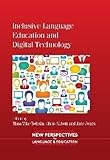Inclusive Language Education and Digital Technology / ed. by Elina Vilar Beltrán, Chris Abbott, Jane Jones.
Material type: TextSeries: New Perspectives on Language and EducationPublisher: Bristol ; Blue Ridge Summit : Multilingual Matters, [2013]Copyright date: ©2013Description: 1 online resource (184 p.)Content type:
TextSeries: New Perspectives on Language and EducationPublisher: Bristol ; Blue Ridge Summit : Multilingual Matters, [2013]Copyright date: ©2013Description: 1 online resource (184 p.)Content type: - 9781847699732
- 9781847699749
- Children with disabilities -- Education
- Language and languages -- Computer-assisted instruction
- Language and languages -- Study and teaching -- Technological innovations
- LANGUAGE ARTS & DISCIPLINES / Study & Teaching
- Deaf language learning
- Hard of Hearing students
- dyslexia
- inclusive language education
- language learners
- language policy
- technology
- 418.0078 23
- P53.855 .I54 2013
- online - DeGruyter
| Item type | Current library | Call number | URL | Status | Notes | Barcode | |
|---|---|---|---|---|---|---|---|
 eBook
eBook
|
Biblioteca "Angelicum" Pont. Univ. S.Tommaso d'Aquino Nuvola online | online - DeGruyter (Browse shelf(Opens below)) | Online access | Not for loan (Accesso limitato) | Accesso per gli utenti autorizzati / Access for authorized users | (dgr)9781847699749 |
Frontmatter -- Contents -- Contributors -- Introduction -- Part 1: The Key Issues -- 1. Modern Foreign Languages as an Inclusive Learning Opportunity: Changing Policies, Practices and Identities in the Languages Classroom -- 2. Technology Uses and Language – A Personal View -- 3. Meeting Special Educational Needs in Technology-Enhanced Language Teaching: Learning from the Past, Working for the Future -- Part 2: Case Studies -- 4. The 21st Century Languages Classroom – The Teacher Perspective -- 5. Using Technology to Teach English as a Foreign Language to the Deaf and Hard of Hearing -- 6. Information and Communication Technology – An Instrument for Developing Inclusive Practice in the Training of Modern Languages Teachers -- 7. Foreign Languages for Learners with Dyslexia – Inclusive Practice and Technology -- 8. Creative Engagement and Inclusion in the Modern Foreign Language Classroom -- 9. Conflicts between Real-Time Resources and the Storage of Digitized Materials: Issues of Copyright -- Conclusion -- Index
restricted access online access with authorization star
http://purl.org/coar/access_right/c_16ec
This volume brings together chapters which collectively address issues relating to inclusive language education and technology. Topics include language teaching to the Deaf, Hard of Hearing and students with dyslexia, benefits of multimodal approaches for language learning, examples of software use in the language classroom, and copyright matters. The book demonstrates not only a commitment to inclusive practices but suggests practical ideas and strategies for practising and aspiring language teachers and those in support roles. The book also provides case studies and relates the issues to theoretical and policy frameworks. In drawing on different European perspectives, the book aims to promote discussion and collaboration within an international community of practice, especially about the role of technology in widening and strengthening opportunities for teachers and pupils alike and ensuring more effective Modern Foreign Language teaching, learning and assessment for all learners.
Mode of access: Internet via World Wide Web.
In English.
Description based on online resource; title from PDF title page (publisher's Web site, viewed 01. Dez 2022)


